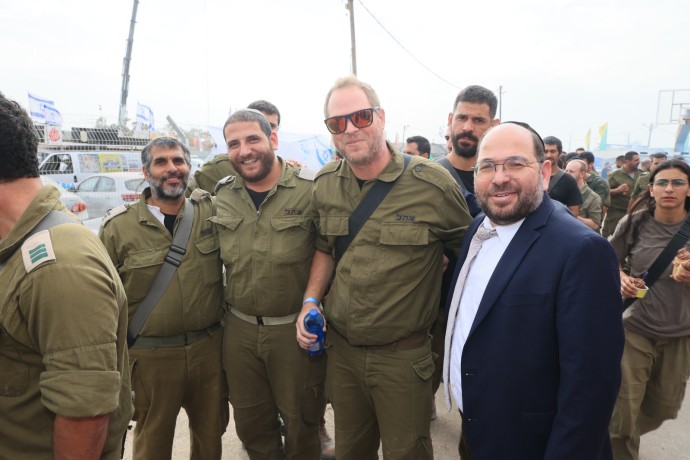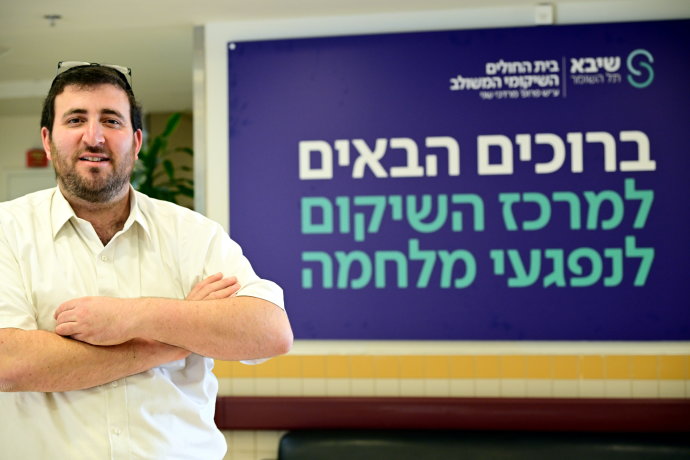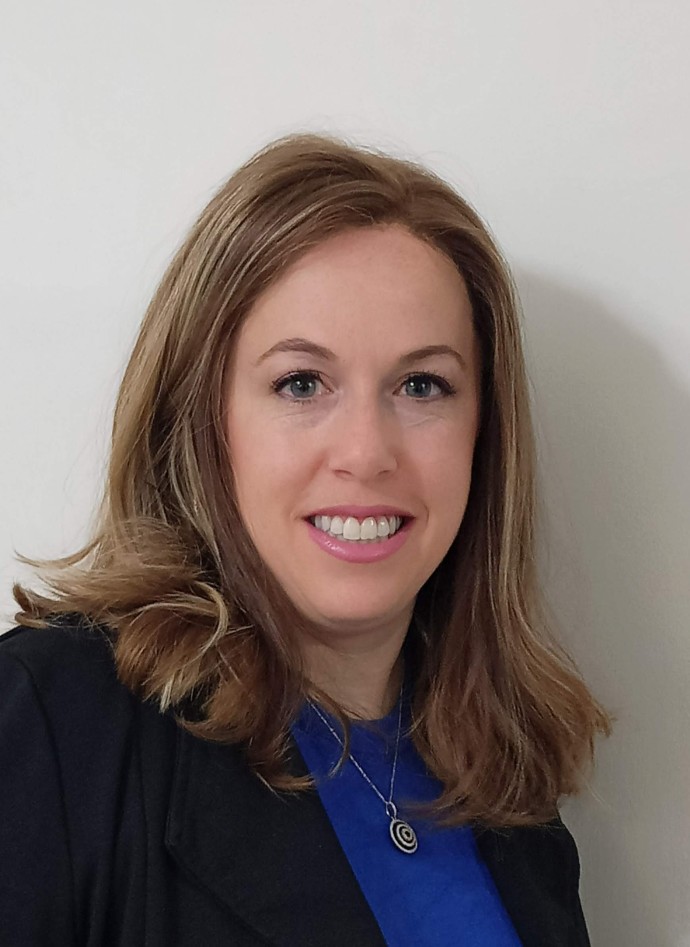Perhaps the most visible slogan of the Israel-Hamas war, prominently displayed on billboards and TV screens, is the motto, “Together we will win,” written in Hebrew as “B’yachad nenatze’ach.”
While formal research on the unity of Israelis during wartime has yet to be conducted, many in Israel report that since the tragic events of October 7, a genuine feeling of togetherness and harmony has existed among the public and has succeeded in overcoming the divisiveness of the period before the war.
One of the most interesting manifestations of the theme of unity among Israelis has been the increased participation of the ultra-Orthodox community in Israeli society since October 7. To the casual observer, this has been manifested by the increasing number of haredim – over 3,000, it has been reported – who have joined the IDF since the beginning of the war.
‘There is no room for ideology. We need to change’
Yet, haredi participation in Israeli society and the home front may signal something far more profound than an uptick in the number of haredi IDF recruits. Among the haredi community, this participation has been expressed by a feeling of a shared destiny with all segments of Israeli society, something which has not always been present.
One of the leading organizations that has epitomized this newfound spirit of cooperation and brotherhood between the haredi community and Israeli society is Achim La-Oref, known in English as Unity in Action. The organization was founded by a group of haredi business and social entrepreneurs, media groups, research institutes, and philanthropic foundations a few months before the war began.

Rabbi Benzion Nordman, a long-time member of the Hadera City Council and current council chair, volunteers for the organization. “Together with a group of people, we said, let’s take all the existing initiatives and encourage new ones. Everyone is harnessing all their resources for this purpose – to be a part of what is happening in the country today.”
Immediately after the war began, the organization opened an operations center to assist all members of the Israeli population in helping people who had lost family members during the attacks; visiting the wounded; providing financial support to families, helping in the picking of fruits and vegetables; and protecting agricultural lands. The latter two initiatives were coordinated in conjunction with HaShomer HaChadash, an organization established in 2007 that attempts to safeguard the land, assist farmers and ranchers, and strengthen the Jewish people’s connections to the land, Jewish values, and Zionist identity.
“The purpose of sending people to visit families in mourning,” explains Nordman, “is to find out what the families need. Representatives from the Chesed Chaim Ve’Emet organization, in partnership with Unity in Action, attended to the practical needs of more than 735 families of the 848 families of civilians killed in the attack, ensuring that they had chairs, food, and anything else they might need.”
Haredi volunteers throughout the country provide assistance to Unity in Action.
Apart from these five areas, says Nordman, haredim are busy preparing and delivering food to soldiers, something which was not done in previous conflicts. Additionally, haredim express their concern for Israel’s soldiers through prayer.
“Everyone in the haredi community has left their comfort zone,” he says. “Everyone has improved in terms of their involvement, the connection that they have, and the understanding that we are involved in a war for our very existence. There is no room for ideology. We need to change. It is terrible that we have had to pay such a dear price for this unity, but things are happening that have completely changed from what was one year ago.”
He adds that it is vital that Israelis become aware of this change in the haredi community.
“If we can’t explain that something significant is happening, then we are missing part of this. My hope is that the Israeli population at large will see how the haredi community has opened its arms and its heart to the initiatives that are coming from the haredi community for the Jewish people.”
Nordman explains that thousands of volunteers are participating in the activities of Unity in Action, and he includes not only those participating in the aforementioned areas but also those who have received the names of specific IDF soldiers to have in mind in their prayers and during their Torah studies.
He says that the efforts of the haredi population to help the home front in the war are a major change in the community’s approach to Israeli society.
He adds that, correspondingly, the secular community in Israel is much more open and receptive than it has been in the past.
Summing up the change, he chuckles, “We never had a haredi organization that dealt with agriculture in Israel.
“Suddenly, they have become haredi farmers. We never had a haredi organization that said, ‘We will take care of food for soldiers or the evacuees.’ We never had an organized effort to offer condolences to the families of the soldiers or appoint watchmen to protect agricultural lands in the periphery. We are only at the beginning.”
In addition to creating new partnerships, Unity in Action has enlisted the help of existing organizations. Aharon Weingarten is the head of Darkei Miriam, an organization named in memory of his mother that assists oncological patients by resolving bureaucratic issues, obtaining financial support, arranging for home help, and providing transportation for patients to and from oncological appointments. Darkei Miriam has also set up pinot hamot (“warm corners”) – rooms within oncology and other departments in hospitals throughout Israel that provide coffee, tea, and cake to visitors.

Since the outbreak of the war, Darkei Miriam has worked with Unity in Action to assist and accompany those affected by the war.
“We want to accompany the wounded who have come here,” says Weingarten, speaking from Hadassah Medical Center in Jerusalem. “Any wounded soldier who arrives at the hospital,” he says, “receives a special kit from Darkei Miriam containing shampoo, slippers, and other personal items.” When a wounded soldier is brought to the hospital, representatives from Darkei Miriam are dispatched within hours to meet with the family.
There are more complicated cases, he says, that require additional assistance. Weingarten cites the case of a woman from Netivot who was wounded and is hospitalized at Hadassah Mount Scopus. Her parents are somewhat older and must travel from Netivot to Jerusalem, a two-hour trip each way, and need food and a place to stay.
Darkei Miriam, explains Weingarten, arranges for this family’s needs.
Another family was evacuated to Eilat because their home was set afire, while the father was hospitalized in Tel HaShomer. The logistics can be complicated, but Darkei Miriam is helping connect the dots and arrange for their needs.
“We want these families to feel comfortable asking us for things, in the same way that a father asks his son for assistance,” says Weingarten.
Weingarten recalls a recent visit to the Loewenstein Rehabilitation Hospital, where they brought the children of a wounded soldier to visit their father.
“In one room, there was an IDF representative, the wounded soldier, and a representative of our organization. When you see this, you realize there are no longer any barriers between these groups. In the beginning, many people were not speaking to each other. But now, they are much more open with each other.”
This openness between groups is also expressed in activities in Israel’s open spaces. Ari Gruen coordinates haredi volunteer activities for Unity in Action with Hashomer HaChadash to place volunteers from the haredi community to help harvest fruits and vegetables.
Thus far, he reports, Achim La-Oref has placed over 1,000 volunteers at farms throughout Israel. “It’s been fascinating,” he says. “There is a spirit of volunteerism now.”
Groups of haredim have picked peppers, eggplant, and beets, and everyone who participates learns about agriculture.
“The experience has been overwhelmingly positive,” he says. “People are reaching out because of this spirit of wanting to help and contributing where they can. From the farmers’ perspective, they are very happy and touched. They desperately need the help.”
Gruen says many haredi-owned businesses and firms have sent employees to work in the fields, and various yeshivot have visited and helped.
“We are hoping to expand this and are bringing in more manpower,” he says. “I am pleasantly surprised with the enthusiasm from across the haredi world. We know that the haredi world is not uniform, but I have gotten calls from a wide spectrum of haredi world.”
The initiatives among the haredim to help the home front are not limited to men.
One of the most interesting organizations is called Sisters of Iron, or in Hebrew, Achayot Mi-Barzel. The organization was formed on October 8, one day after the war began, by a group of women active in the haredi world who have initiated and managed organizations. Chana Irom, who heads the group, explains: “We wanted to do two main things. We wanted to arrange for personal help that would go across group boundaries, and we also wanted to make long-lasting connections.”

Sisters of Iron ramped up quickly with 1,000 volunteers, and now numbers 2,000 volunteers throughout the country. In the words of Irom, the organization is “anything that a sister would do for a sister. This can range from bringing a hot-cooked meal personally to another family; helping with children; or going to a woman’s house and taking over for a few hours, allowing her to go out.”
Irom says that in the first month, the primary beneficiaries were wives who had family members who were wounded, evacuated, or being held captive; or families of soldiers in the IDF reserves who had been wounded.
After the first month, Sisters of Iron connected with Unity in Action and has been focusing many of its efforts on assisting wives and families whose husbands have been called to reserve duty. The organization is providing assistance to families throughout Israel, and Irom hopes to continue in this spirit of reaching out after the war ends.
“This is my vision. On the one hand, we have things to do now. On the other, I want this organization to be something big, that haredi women could trust to bring unity to other sectors.”
Irom explains that for years, haredi women have been volunteering within their own closed communities, providing assistance to those in need, and therefore have unique skills and abilities in this area.
“This is the first time someone has said, ‘Let’s do this outside with other groups.”
She adds that the response from the secular world has been positive. Initially, Irom had connected with a secular organization that assists wives of soldiers in the army.
“I contacted her, and she said that they didn’t think that haredi women could understand the concept of IDF reserve duty (miluim) or help us. I told her that haredi women are very intuitive and understand feelings.” Ultimately, the two organizations worked things out and have helped each other.
Irom is grateful for the assistance her organization, like so many others, has received from Unity in Action. “They are supporting us fully.”
Encapsulating the wishes of so many, she says, “I hope this spirit of unity in the nation that I see in the haredi world and all sectors will last and enable us to do great things together.”
